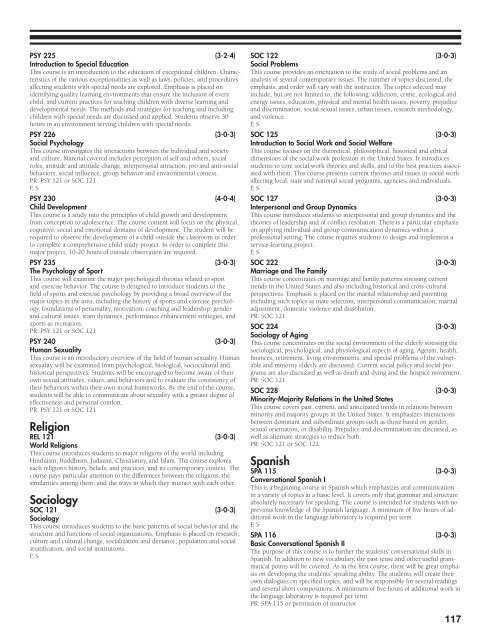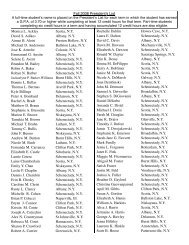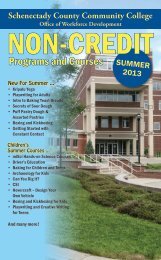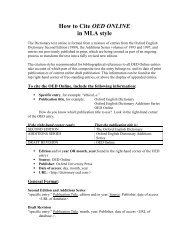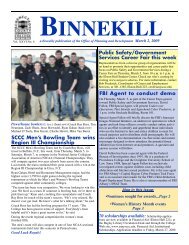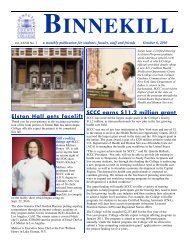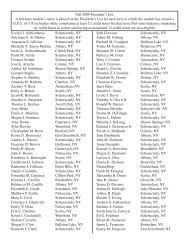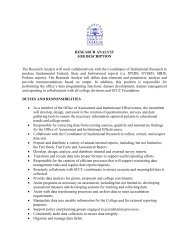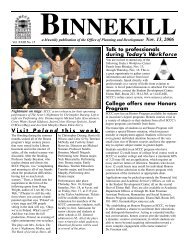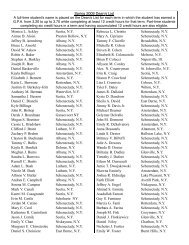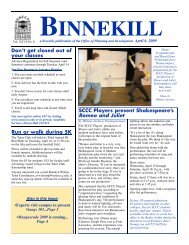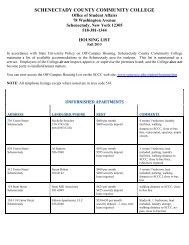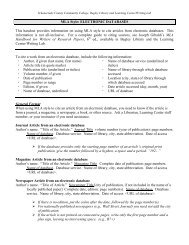2011-2012 CaTalog - Schenectady County Community College
2011-2012 CaTalog - Schenectady County Community College
2011-2012 CaTalog - Schenectady County Community College
- No tags were found...
You also want an ePaper? Increase the reach of your titles
YUMPU automatically turns print PDFs into web optimized ePapers that Google loves.
PSY 225 (3-2-4)Introduction to Special EducationThis course is an introduction to the education of exceptional children. Characteristicsof the various exceptionalities as well as laws, policies, and proceduresaffecting students with special needs are explored. Emphasis is placed onidentifying quality learning environments that ensure the inclusion of everychild, and current practices for teaching children with diverse learning anddevelopmental needs. The methods and strategies for teaching and includingchildren with special needs are discussed and applied. Students observe 30hours in an environment serving children with special needs.PSY 226 (3-0-3)Social PsychologyThis course investigates the interactions between the individual and societyand culture. Material covered includes perception of self and others, socialroles, attitude and attitude change, interpersonal attraction, pro and anti-socialbehaviors, social influence, group behavior and environmental context.PR: PSY 121 or SOC 121F, SPSY 230 (4-0-4)Child DevelopmentThis course is a study into the principles of child growth and developmentfrom conception to adolescence. The course content will focus on the physical,cognitive, social and emotional domains of development. The student will berequired to observe the development of a child outside the classroom in orderto complete a comprehensive child study project. In order to complete thismajor project, 10-20 hours of outside observation are required.PSY 235 (3-0-3)The Psychology of SportThis course will examine the major psychological theories related to sportand exercise behavior. The course is designed to introduce students to thefield of sports and exercise psychology by providing a broad overview of themajor topics in the area, including the history of sports and exercise psychology,foundations of personality, motivation, coaching and leadership, genderand cultural issues, team dynamics, performance enhancement strategies, andsports as recreation.PR: PSY 121 or SOC 121PSY 240 (3-0-3)Human SexualityThis course is an introductory overview of the field of human sexuality. Humansexuality will be examined from psychological, biological, sociocultural andhistorical perspectives. Students will be encouraged to become aware of theirown sexual attitudes, values, and behaviors and to evaluate the consistency oftheir behaviors within their own moral frameworks. By the end of the course,students will be able to communicate about sexuality with a greater degree ofeffectiveness and personal comfort.PR: PSY 121 or SOC 121ReligionREL 121 (3-0-3)World ReligionsThis course introduces students to major religions of the world includingHinduism, Buddhism, Judaism, Christianity, and Islam. The course exploreseach religion’s history, beliefs, and practices, and its contemporary context. Thecourse pays particular attention to the differences between the religions, thesimilarities among them, and the ways in which they interact with each other.SociologySOC 121 (3-0-3)SociologyThis course introduces students to the basic patterns of social behavior and thestructure and functions of social organizations. Emphasis is placed on research,culture and cultural change, socialization and deviance, population and socialstratification, and social institutions.F, SSOC 122 (3-0-3)Social ProblemsThis course provides an orientation to the study of social problems and ananalysis of several contemporary issues. The number of topics discussed, theemphasis, and order will vary with the instructor. The topics selected mayinclude, but are not limited to, the following: addiction, crime, ecological andenergy issues, education, physical and mental health issues, poverty, prejudiceand discrimination, social sexual issues, urban issues, research methodology,and violence.F, SSOC 125 (3-0-3)Introduction to Social Work and Social WelfareThis course focuses on the theoretical, philosophical, historical and ethicaldimensions of the social work profession in the United States. It introducesstudents to core social work theories and skills, and to the best practices associatedwith them. This course presents current theories and issues in social workaffecting local, state and national social programs, agencies, and individuals.F, SSOC 127 (3-0-3)Interpersonal and Group DynamicsThis course introduces students to interpersonal and group dynamics and thetheories of leadership and of conflict resolution. There is a particular emphasison applying individual and group communication dynamics within aprofessional setting. The course requires students to design and implement aservice-learning project.F, SSOC 222 (3-0-3)Marriage and The FamilyThis course concentrates on marriage and family patterns stressing currenttrends in the United States and also including historical and cross-culturalperspectives. Emphasis is placed on the marital relationship and parentingincluding such topics as mate selection, interpersonal communication, maritaladjustment, domestic violence and dissolution.PR: SOC 121SOC 224 (3-0-3)Sociology of AgingThis course concentrates on the social environment of the elderly stressing thesociological, psychological, and physiological aspects of aging. Ageism, health,finances, retirement, living environments, and special problems of the vulnerableand minority elderly are discussed. Current social policy and social programsare also discussed as well as death and dying and the hospice movement.PR: SOC 121SOC 228 (3-0-3)Minority-Majority Relations in the United StatesThis course covers past, current, and anticipated trends in relations betweenminority and majority groups in the United States. It emphasizes interactionsbetween dominant and subordinate groups such as those based on gender,sexual orientation, or disability. Prejudice and discrimination are discussed, aswell as alternate strategies to reduce both.PR: SOC 121 or SOC 122SpanishSPA 115 (3-0-3)Conversational Spanish IThis is a beginning course in Spanish which emphasizes oral communicationin a variety of topics at a basic level. It covers only that grammar and structureabsolutely necessary for speaking. The course is intended for students with noprevious knowledge of the Spanish language. A minimum of five hours of additionalwork in the language laboratory is required per term.F, SSPA 116 (3-0-3)Basic Conversational Spanish IIThe purpose of this course is to further the students’ conversational skills inSpanish. In addition to new vocabulary, the past tense and other useful grammaticalpoints will be covered. As in the first course, there will be great emphasison developing the students’ speaking ability. The students will create theirown dialogues on specified topics, and will be responsible for several readingsand several short compositions. A minimum of five hours of additional work inthe language laboratory is required per term.PR: SPA 115 or permission of instructor117


